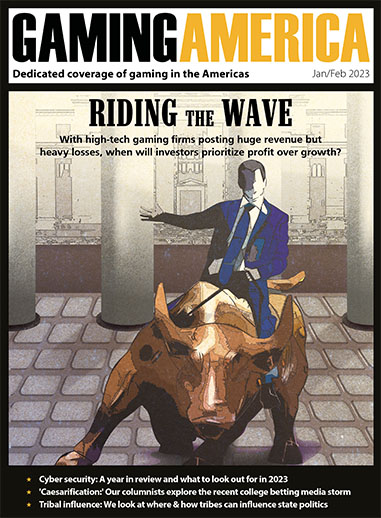
The widely publicized (and criticized) New York Times series of articles about US online gambling and some troublesome activities associated with it have blown the conversation wide open. Some of the reaction has been entirely predictable from the pro gambling lobby, calling into question the veracity and relevance of the articles (and, to be fair, bleating about lobbying by the operators is laughable in the context of every other imaginable industry doing the same thing).
On the other hand, some of the language used by those looking to rein in the industry has been equally risible – a state senator, speaking about the entirely reasonable concept of limiting promotional credit, complained that: “The mobile sports betting industry is utilizing targeted advertising that is personally tailored to lure in new customers from right within their homes.” Just wait until he finds out about Amazon, he’s going to lose his mind.
Whether the detail of the articles is all 100% true, and whether there are some elements that have been sensationalized, there are undoubtedly some concerning elements. The concept that online sportsbooks have partnered with college institutions to the extent of dominating campuses with advertising is deeply unsettling to me, for example. And at the very least, this demonstrates that some operators are able to make enough money, at high enough speed, to disregard the optics of what they’re doing. Nobody could have thought that would be a good look.
However, having said previously that the US industry is many years behind the evolution of the European equivalent, maybe they’re catching up. While there is the potential of massive problem gambling being seeded right now, in a world without consistent (or in some states adequate) regulation, the emergence of the problem into public discussion has to be a positive. I mean this both in terms of a spur for continued sector progress towards a better framework of protection (for players and, yes, I guess the operators’ futures), but also in terms of assisting players to recognize their responsibilities to themselves.
"The concept that online sportsbooks have partnered with college institutions to the extent of dominating campuses with advertising is deeply unsettling to me."
I spoke with Catie Di Stefano, who in fact by her very employment, represents an interesting step forward. Catie is Director of Community Marketing at OnlineGamblers.com, and the fact an affiliate site has anyone in this type of role – player protection and education – might not have been something you’d have seen even five years ago in Europe.
Catie has been involved in the European betting/gaming industry for 11 years, and now has shifted focus to the US, so she is well aware of both the harm gambling can inflict, and also the impact of over-regulation (with Spain, her current location, as a prime example).
She said: “We’ve seen how things have developed in each European country, and want to protect US players. A large part of this is via education – players generally either can afford to gamble without impact on their lives, or they can’t – and it’s important for us to help them figure out which category they are in.”
Her view is that prevention, via education and other tools, is more effective than attempting to cure issues once they occur, and while this is of course preferable, it’s not easy. She told me “it’s critical that every partner in the process helps with the education piece, from my company on the affiliate side, to payment providers, the platform, and of course operators.”
I don’t think anyone would disagree with that view, but my concern is that there’s so much money floating around the system, that short-term incentives are in danger of dominating a longer -term view.
The industry in the US has also adopted a familiar refrain from Europe – regulated gambling is better than unregulated gambling (Catie – “people in the US used to be able to get a bet on through their cousin’s cousin – but that was a problem once money was owed”) and once again this stands up to scrutiny; although there’s a reason why so much marketing money is being spent – and it’s not just to bring illegal bettors into the regulated fold. New blood is the subject of the gold rush.
Also relevant is the phenomenal tax revenue being generated, but the debate is nuanced. How much tax revenue is enough to offset one gambling-related teen suicide? Tabloid headlines would tell you that there’s no amount of tax that could make up for one tragedy of that nature, but that’s a sophomoric take – if it’s one tragedy vs $1bn, clearly the $1bn could be deployed to save a vastly higher number of lives. More than one person dies from alcohol-related issues every year, but there’s not much danger of booze being banned (again). Always, always shades of grey.
"There’s a reason why so much marketing money is being spent – and it’s not just to bring illegal bettors into the regulated fold. New blood is the subject of the gold rush."
I checked in with Bill Pascrell III (BP3) once more after our first conversation, and he reinforced Catie’s points, particularly about prevention being the better option than cure. He also pointed out that there are bound, in a developing industry, to be operators that go “off the rails” in the early days (FTX, anyone?), but that a collaborative approach between operators and indeed legislators will be the best way to move forward – together.
There does need to be an impetus behind efforts to work together, however, and I do wonder if the sort of negative press we’re starting to see might be part of that impetus. Governments and regulators have multiple stakeholders to satisfy, and while it’s not simply the case of “whoever shouts loudest,” it’s not ludicrous to suggest that a bit of negative press might help to forge bonds between regulators and operators to the benefit of all.
There’s a limit to how much of that can be beneficial to the industry, but whatever one might consider as the developmental gap between online gambling in the USA vs Europe – somewhere between 5 and 15 years, you’d think – it’s closing fast, and screaming newspaper headlines underline that. While concerns are of course legitimate, both respectable and overwrought headlines feel like almost a rite of passage in every jurisdiction that has legalized gambling (of any sort), and hopefully can have a galvanizing effect on all concerned in the US market.
"It’s not ludicrous to suggest that a bit of negative press might help to forge bonds between regulators and operators to the benefit of all."
There’s still a way to go, mind – Brad Allen of online gambling consultancy firm Eilers and Krejcik, who I spoke to when writing this piece, pointed out an absolute gem online. One bookie or other in the USA planted the feel-good story of “a 20-something teacher from NY” and their $90,000 bet on Morocco to reach the soccer World Cup quarter finals winning $1m. He claimed he’d built up his bankroll using parlays and knew nothing about Morocco, it was just “a hunch.”
If you ever need to see that the development gap in the US industry vs Europe still exists, imagine seeing that story these days in the UK press. You’d have the AML/source of funds investigation crashing through your door in rapid style demanding proof of where this guy, who definitely is neither a criminal nor a front for someone else, got hold of double his annual salary for a hunch bet….

